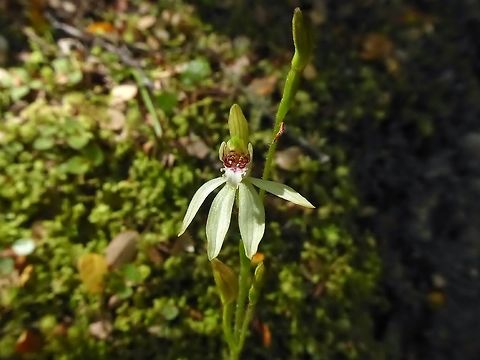
Appearance
''Caladenia chlorostyla'' is a terrestrial, perennial, deciduous, herb, usually occurring as a solitary individual. It has an underground tuber and a single sparsely hairy, bright green, narrow linear leaf up to 5–15 cm long and 1–3 mm wide.One, sometimes up to five, unscented flowers up to 11–16 mm in diameter are borne on a thin, wiry spike, 1–30 cm tall. The sepals and petals are white, pale mauve or pinkish with greenish-white tips. The dorsal sepal is erect with its sides turned forwards, the lateral sepals are held horizontally and flat and the petals either spread widely or turn inwards. The dorsal sepal is 6–11 mm long and narrow egg-shaped, the lateral sepals and petals are 6–8 mm , about 2 mm wide, curved like a sickle and egg-shaped with the narrower end towards the base. Flowering occurs between September and January and is followed from December to April by the fruit which is a green, oval-shaped capsule 10–12 mm long which sometimes has purple stripes.
Naming
''Caladenia chlorostyla'' was first formally described in 1997 by David Jones, Brian Molloy and Mark Clements from a specimen collected by Clements near the Tinline River. The description was published in ''The Orchadian''. The specific epithet is derived from the Ancient Greek words ''chloro-'' meaning green:201 and ''stylos'' meaning "pillar" or "style".:608Distribution
This caladenia grows in sunny position in scrub but also in old-growth forests and frequently in mature pine plantations.Status
''Caladenia chlorostyla'' was classified in 2012 as "not threatened".Habitat
This caladenia grows in sunny position in scrub but also in old-growth forests and frequently in mature pine plantations.References:
Some text fragments are auto parsed from Wikipedia.